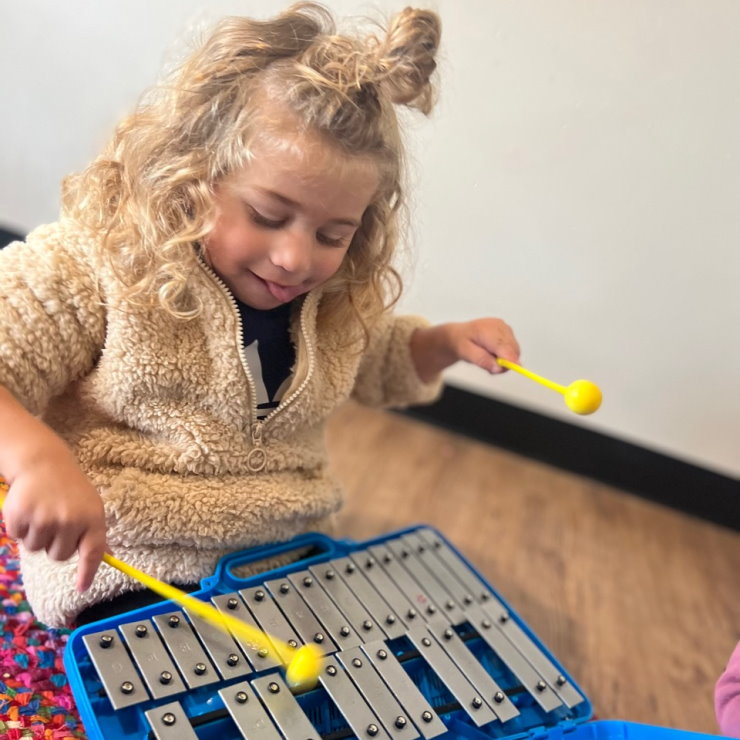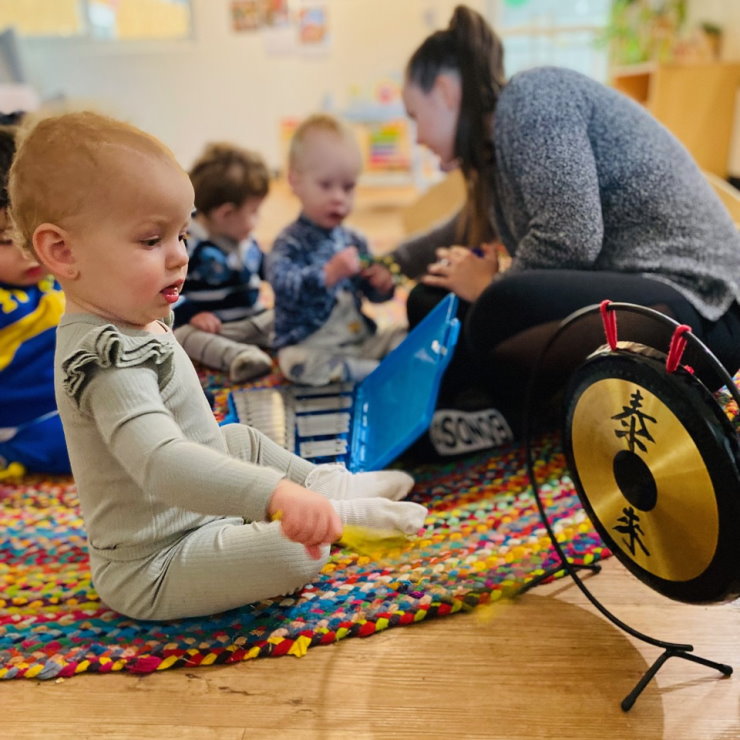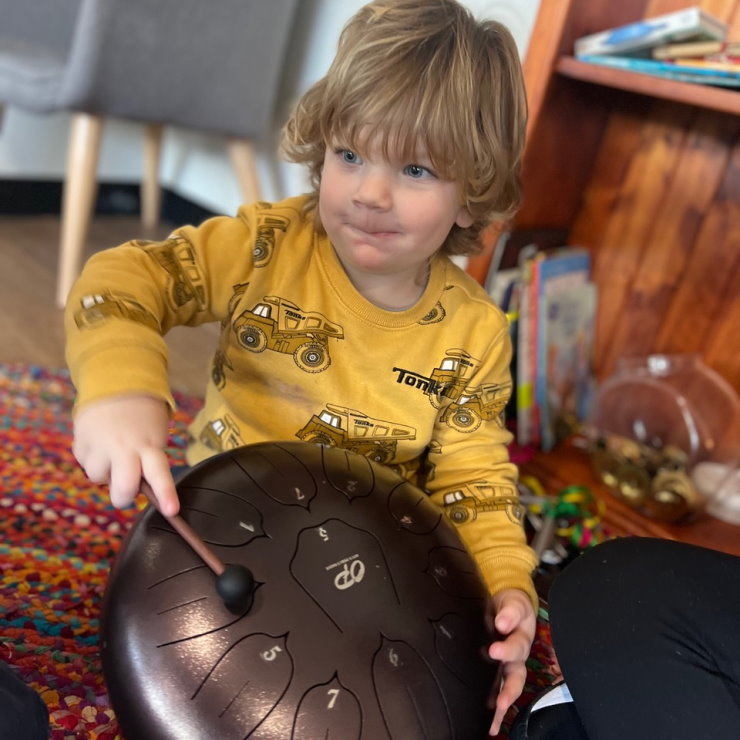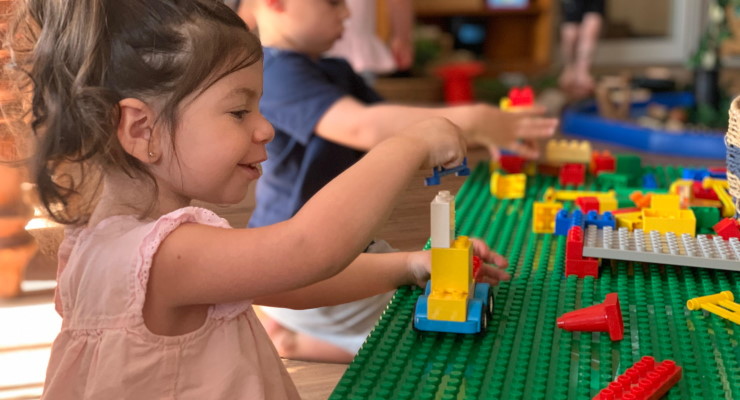La Cucaracha! Ring ring, Bang bang, Toot toot! Just some of the many sounds the mini-maestros at Grace Village are learning to make and sing!

Why? Because music is fun, music brings us together and makes us happy! Oh, and early childhood music-making is one of the few activities known to promote both the logical and creative sides of a growing brain.
Music is so important that Grace Village has introduced a new music program called “Reid The Music” for all our children, no matter the age group.
Forget scales and rote music learning, we’re into child-led play-based music classes!
Music Classes and Reggio Emilia
Grace Village follows the pedagogy of Reggio Emilia and our play-based music lessons fit in perfectly.
This play-based philosophy gives our children the opportunity to explore their creativity, experimenting and discovering music and its joy, at their own pace, in a nurturing environment.
Playing with sounds, rhythm, and rhyme encourages communication by asking questions, using language, and discovering new things.
Our music classes focus on developing social skills and collaboration, through making sounds, and singing in groups, where each child is an equal participant, their thoughts and questions valued.
Why music is beneficial for babies
From 9 months old, babies are sensitive to sensory experiences and they particularly listen intently to musical sounds. Loud noises may startle them, but they may feel comforted with soothing rhythmic sounds like a lullaby. Lullabies settle babies and the connection with the adult. The slow rocking with a lullaby also gives them a sense of security and comfort.
You have probably seen your baby bounce when music is played. Their whole body can respond to the sounds. When playing instruments, older babies may sway, rock from side to side or bend their knees and jump up and down. They instinctively know and love to play music.

Our music classes for babies at Grace Village
We use shakers to teach our babies to make a noise – and then stop the noise! The look on their faces when they learn they can control the noise is priceless.
We sing improvised songs to include some of the sounds our babies make, so they can join in and encourage their fine motor skills, we sing finger rhymes. Our babies’ favourite is “Round and round the garden”, where we gently trace our fingers on their arms along with the song.
The benefits of music for toddlers
Toddlers are interested in every sound they hear particularly strong rhythmic music. Give your toddler more opportunities to play with sounds and music freely and in more structured ways.
Toddlers learn by using their whole bodies with large muscle activities. At this age, they prefer to do than listen. They will follow the fast or slow tempo and love to dance as they can learn to control their physical responses to the music.
Use repetition, rhyme, fingerplays and simple action songs and you’ll soon have them dancing, singing and laughing along!

Our music classes for toddlers at Grace Village
We use finger cymbals to represent a crocodile, clapping our fingers together like crocodile teeth. We talk about the different volumes and link them with imaginative settings.
We like to explore music from other cultures, we sing ‘La Cucaracha’ with percussion instruments to engage with the Spanish folk rhythms.
Musical benefits for preschoolers
Music helps your preschooler with their brain development. It creates new pathways in the brain to improve your child’s cognitive development.
Songs and rhymes expand your child’s language and vocabulary. It’s the repetition of the songs, how the words are put together and the learning to memorise the song that is beneficial to your preschooler.
Music also teaches sound patterns through rhythm, syllables, and alliteration. These are all needed and used for the basis of numeracy and literacy. Music and its sounds help your preschooler make sense of their hearing which is vital for reading skills.
Music works on your child’s fine and gross motor skills. Fine motor skills are developed as they construct their own instruments, through imaginative finger plays and action rhymes. Gross motor skills are learned when playing a large instrument, fun music games and dancing.
Pre-schoolers learn self-expression and confidence through free dance, movement and music beats (watch how many dance moves each preschooler uses to the same music).

Our music classes for pre-schoolers at Grace Village
We introduce the children to our Tongue Drum. How we can make a ringing sound and different pitches with our tongue.
We explore an echo and talk about what it is and how we can control an echo when they play music.
During our rhythm lessons, we challenge our little ones to develop their understanding of rhythm and how this connects with other types of music.
How can you incorporate music into play-based scenarios for your child?
- Have your little one make their own instruments from items in the recycling. Explore how different materials can make different sounds. Discover when you change the instrument and how it can make diverse sounds.
- Play some orchestral music and make-up songs that go with the beat (this always ends in lots of laughs!).
- Look in the pot drawer – there are some great drums in there! How many beats can you make? Can you do soft beats and LOUD beats? What happens when you hit the pot with something else? Or put the pot on a different surface?
- Always dance!
You don’t have to be a great singer, guitar or piano player to enjoy making music, so leave your inhibitions at the door, parents, just put the music on and let your child lead the way. You’ll never find better music teachers!

Discover more about Reid The Music
Join our Centre Director for a 30 minute guided tour of Grace Village Early Learning and find out more about your child’s home away from home!

